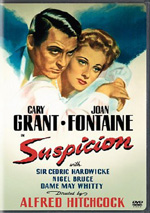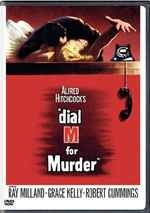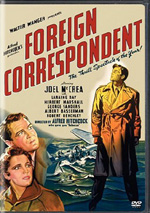|
WARNER
|

| |
|
MOVIE INFO
|
|
Director:
Alfred Hitchcock
Cast:
Cary Grant, Joan Fontaine, Cedric Hardwicke, Nigel Bruce, Dame May Whitty, Isabel Jeans, Heather Angel, Auriol Lee, Reginald Sheffield
Writing Credits:
Anthony Berkeley (novel, "Before the Fact", as Francis Iles), Samson Raphaelson, Joan Harrison, Alma Reville
Tagline:
Each time they kissed ... there was the thrill of love ... the threat of murder!
Synopsis:
In Suspicion, wealthy, sheltered Joan Fontaine is swept off her feet by charming ne'er-do-well Cary Grant. Though warned that Grant is little more than a fortune-hunter, Fontaine marries him anyway. She remains loyal to her irresponsible husband as he plows his way from one disreputable business scheme to another. Gradually, Fontaine comes to the conclusion that Grant intends to do away with her in order to collect her inheritance ... a suspicion confirmed when Grant's likeable business partner Nigel Bruce dies under mysterious circumstances. Suspicion's stylish chills put Alfred Hitchcock on the top of the Hollywood heap...and keeps audiences on the edges of their seats to this day. So hang on for an-all suspence that's all-out Hitchcock!
MPAA:
Rated NR
| |
|
DVD DETAILS
|
Presentation:
Fullscreen 1.33:1
Audio:
English Monaural
French Monaural
Subtitles:
English
Spanish
French
Closed-captioned
Runtime: 99 min.
Price: $19.97
Release Date: 9/17/2004
Bonus:
• Before the Fact: Suspicious Hitchcock
• Trailer
| |
|
PURCHASE @ AMAZON.COM
|

| |
|
EQUIPMENT
|
Mitsubishi WS65315 65" TV; Pioneer VSXD409 Home Theater Receiver; Sony DVP NC665P 5 Disc DVD player; KLH Home Theater Speakers
| |
|
RELATED REVIEWS
|


| |
[an error occurred while processing this directive]
|
Suspicion (1941)
|
|
Reviewed by Brian Ludovico (December 27, 2004)
After back-to-back viewings of Hitchcock Signature Collection members Dial M for Murder and Foreign Correspondent, and knowing Strangers on a Train was waiting in the wings, I was starting to wonder when this little group of discs would yield the inevitable stinker. Not that I wanted to find one, mind you, but no matter how great a body of work is, there’s bound to be a few sub-par affairs. Heck, even Mickey Mantle hit .237 one year (albeit his last year).
To avoid a clunker if possible, I decided to stick with what appeared to be a safe bet: the Cary Grant and Joan Fontaine vehicle Suspicion. Grant had been so fantastic in some of my favorite Hitchcock “hall of fame” movies like Notorious and North by Northwest, and Fontaine was fresh off the lead in Rebecca. So much for the safe bet, because folks, Suspicion is a stinker, especially in Hitchcock terms.
The premise of the story is a good one: a woman falls quickly in love with a man whom she knows very little about, only to make some disturbing connections about him in her own mind, and start to suspect that he might be a murderer. It’s sort of Spellbound meets Shadow of Doubt. Johnny and Lina actually become acquainted when a group of single women in a rural English town introduce them on their way to church. Lina has had her eye on Johnny for a few days, as he’s always appearing in the society pages of the local paper, and they’d encountered each other a few days before.
Johnny hijacks her on the way to church. Instead, he takes her for a walk, where after what appears to be a violent struggle, they begin a flirtation with almost as much electricity as a wet noodle. It ends with a kiss that’s supposed to be passionate, but really just isn’t.
Johnny goes away for a while, leaving Lina to yearn for him and wait for his phone call. Because he’s a total player, he doesn’t call for three weeks. When he does call, they reunite, and Johnny demands that she marry him. Mind you, they’ve spent all of a couple of hours together, and this is still ten minutes into the movie. She’s a spinster, so she agrees, and they go on a whirlwind European honeymoon. When they get back, they arrive at a palatial home, fully staffed with servants. Lina is thrilled…until a telegram arrives demanding that Johnny pay back a thousand pounds he borrowed to go on the honeymoon.
Lina gets a little unsettled, and starts to ask Johnny why he married her. More specifically, she wants to know if her father’s fortune had anything to do with it. Surprisingly, the brash, arrogant Johnny tells her that yes, it had a lot to do with it. This immediately raises Lina’s suspicions, and when her father passes away, she fears for her life. Johnny’s continuous lies, serious interest in murder mystery books, and what she believes to be mounting gambling debts all add up to motive and opportunity. It’s only a matter of time before Johnny makes an attempt on Lina’s life. Is he a pathological liar and a murderer, or is she just a paranoid bookworm?
Sounds pretty promising, right? Perhaps that promise only contributes to how disappointed I was by the film. It’s like watching Randy Moss take plays off in the middle of the game. It’s ugly because of the limitless potential he has. Give me a less-talented guy trying harder even if he can’t reach that same pinnacle, rather than a superstar who’s read way too much of his own press. So what goes wrong in Suspicion?
In Foreign Correspondent, the love angle was such a secondary story line that its hastiness was only a minor annoyance. It wasn’t the film’s raison d’etre. In Suspicion, such a hasty love story is the very crux of the entire story. I will never believe, no matter how many movies do it, that within fifteen minutes of screen time, two people can go from complete strangers to wedded bliss. Because of that, I can’t ever really get into the relationship. To me, she shouldn’t be surprised at anything Johnny does. She doesn’t know him at all. The lack of chemistry onscreen completely undermines any possibility that Johnny is in love with Lina, which wouldn’t have been such a problem if it weren’t for the ending.
The original ending, the one Hitch wanted, would have really helped this film’s shortcomings, but studios wouldn’t let it happen. Hitchcock was so convinced that he’d be able to get his way that he actually filmed much of the story without the finale completely done. He figured once he got there, the studio would say “go ahead.” Instead, he had to write an ending that just doesn’t feel like a Hitchcock movie. It’s far too happily ever after, and it lets all the characters off the hook. To be frank, I absolutely hated it.
The ending and the relationships aren’t the only problems, they’re just the most obvious ones. There’s far, far too much soap opera technique here, with an overloaded swelling score and a ton of accompanying earnest looks from Lina that are meant to convey pretty much any emotion. The film takes a long time to really get rolling, and when it does, it’s over inside of fifteen minutes. The performances are uncharacteristically over-the-top, particularly Fontaine’s quivering Lina, which only makes it more shocking that she actually took home the Academy Award for this role. There’s almost no humor in the story, something decidedly unlike the director.
To me, the film’s only saving grace is the injection of life that Johnny’s old school chum, Beaky (Nigel Bruce), brings to the story. The film’s most proficiently played character is the only vestige of comedy in the film, and Bruce plays him with a perfect combination of British charm and ill timing. His interactions with Lina are the best scenes in the film not involving a glowing glass of milk (the only moment in the film that feels uniquely Hitchcock). Otherwise, Suspicion is a forgettable entry that is best skipped over for its many superior brethren.
|
The DVD Grades: Picture D+/ Audio C-/ Bonus D+
|
|
Suspicion appears in an aspect ratio of 1.33:1 on this single-sided, double-layered DVD; due to those dimensions, the image has not been enhanced for 16X9 televisions. Unfortunately, we see a decline in quality from Foreign Correspondent, which was a decline from Dial M for Murder. I can only imagine what it would have looked like had the print not undergone some restorative measures for its participation in the late Eighties colorization craze.
This restoration didn’t exactly do wonders for the picture, because like Foreign Correspondent, which was not restored, Suspicion looks like an old movie. The black and white picture lacks the shading detail to make a really great DVD picture, which leads to a less three-dimensional look than the one DVD can produce, even on older pictures. As usual, we see the pervading graininess, which can be overlooked as the nature of the beast, but we’ve also got other picture flaws, like nicks and scratches, one of which taking the form of a vertical black streak that holds in frame for ten or twelve seconds, that can’t be forgiven. It’s a poor showing even for a movie as old as this one.
The audio is another fairly bland monaural track, whose main concern is clarity. Even here, Suspicion falters in too many spots. More often than not, it’s a perfectly serviceable track for an older film, reproducing the dialogue well and with appropriate volume. The problems arise when the dialogue has to battle with the almost comically melodramatic score by Franz Waxman, where the mix gets a little muddled. There are also a few instances of the Grant and Fontaine interplay sounding tinny and fuzzy. In short, this is a below average track, even for an older Hitchcock movie.
Besides the film’s terrible looking theatrical trailer - which runs around 100 seconds and appears to have a skip in it - the only other bonus is a twenty-one minute featurette titled Before the Fact: Suspicious Hitchcock. As with the rest of these Signature Collection featurettes, the featurette is pretty informative. Once again, we get to hear from Peter Bogdanovich (whose impressions are becoming tiresome), the Schickmeister, Robert Osborne, Pat Hitchcock O’Connell and even music historian Christopher Husted. Some of the more interesting tidbits include some cursory discussion about the working relationship between Hitch and Cary Grant, which started here, recollections of Nigel Bruce, and talks of the film’s colorization.
The most intriguing information is exactly what I was hoping to find: talk of a completely different ending, one that Hitchcock wanted and the studio, or the Hayes code, or the combination of the two, wouldn’t allow. It gives Hitch at least some measure of justice knowing that something like this was the original plan.
These new Hitchcock DVD’s are going to trade squarely on the strength of the movie. That’s too bad for Suspicion, because besides its lackluster bonus package and poor technical marks, the movie just isn’t good. It’s a slow-moving film that really lacks any charisma in spite of Cary Grant, the female character is annoying, and the ending is almost embarrassing. This film actually belongs in the “B” or “C” tier of Hitchcock films, so only the most avid Hitch fan would find this disc a good buy.
|
|
Viewer Film Ratings: 4.4444 Stars | Number of Votes: 9 |
|
|

